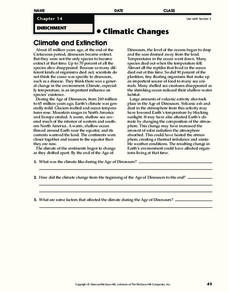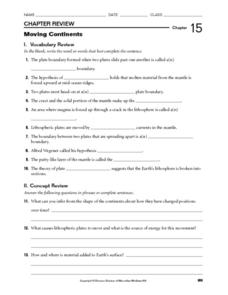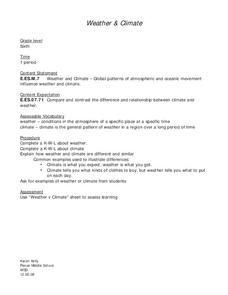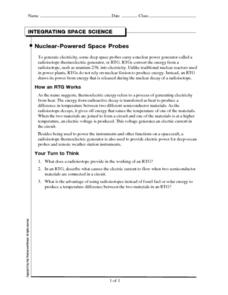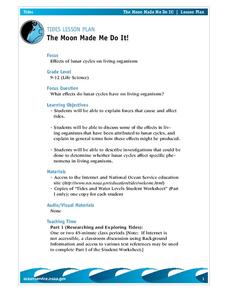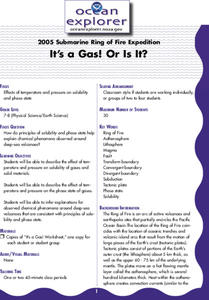Curated OER
The Tides-Ups and Downs
Students investigate tidal patters and the forces that cause the tides. In this tidal lesson plan, students explore and research the tides and complete 43 questions about the causes of the tides, how they are monitored and measured and...
Curated OER
Climatic Changes
In this weather worksheet, middle schoolers read an excerpt describing the climate and extinction. Then they explain what the climate was like during the Age of Dinosaurs. Students also determine some factors that affected the climate...
Curated OER
Tomography
In this tomography worksheet, learners read about how tomography is used to help oceanographers learn more about the Earth's surface below the ocean. Students complete 3 short answer questions based on the reading.
Curated OER
Living With the Heat: The Ring of Fire
Students investigate the planet Earth's infamous ring of fire and the life that thrives from it. In this ocean environment instructional activity, students investigate hydrothermal vents and how organisms thrive off their heat....
Curated OER
Moving Continents
In this moving continents worksheet, students review the different types of plate boundaries, what causes earthquakes, and where volcanoes are formed. This worksheet has 10 fill in the blank and 9 short answer questions.
Curated OER
Weather & Climate
Sixth graders differentiate weather and climate. In this earth science lesson, 6th graders complete a KWL chart about the two. They complete a worksheet by identifying whether a certain statement describes weather or climate.
Curated OER
Nuclear-Powered Space Probes
In this space probes worksheet, students read about radioisotope thermoelectric generators and how they work. Then students complete 3 short answer questions.
Curated OER
Weather, Sea Level Rise and Climate Change
Students differentiate weather and climate. In this earth science lesson, students compare weather and climate in different regions of the world. They interpret weather graphs and compare isotherm lines of northern and southern hemisphere.
Curated OER
The Moon Made Me Do It!
Students research about how lunar cycles affect living organisms. In this biology lesson plan, students prepare an oral presentation of their research results and analyses. They explore the forces that affect tides.
Curated OER
At the Edge of the Continent
Students study how to interpret a bathymetric map. They study the main features of the continental margin. They plot and graph bathymetric data. They think about and discuss the bathymetry of the edge of the cont
Curated OER
Converging Earthquake!
Students identify the fault lines and tectonic plates on the map. For this earth science lesson, students simulate landscape formation using robots. They take a quiz at the end of the lesson to demonstrate mastery.
Curated OER
Weather and Oceans: Uneven Heating of the Earth
Students investigate what causes the heat on Earth. In this Earth heating instructional activity, students experiment with different heat sources and determine where the Earth gathers the most heat. Students explore vocabulary words...
Curated OER
It's a Gas! Or is it?
Learners discover the principles of solubility and phase state and their influence on chemical phenomena observed around deep-sea volcanoes. They describe the effect of temperature and pressure on solubility of gasses and solid materials.
Curated OER
Hudson Canyon Expedition Let's Bet on Sediments!
Students investigate and analyze the patterns of sedimentation in the Hudson Canyon students observe how heavier particles sink faster than finer particles. They study that submarine landslides (trench slope failure) are



